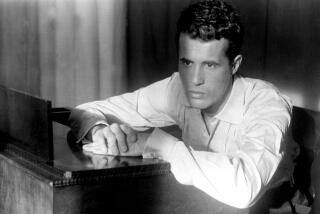Director was best known for his antiwar films
- Share via
Kon Ichikawa, a Japanese film director best known for his antiwar films “The Burmese Harp” and “Fires on the Plain” as well as “Tokyo Olympiad,” his documentary on the 1964 Summer Olympics, has died. He was 92.
Ichikawa died of pneumonia Wednesday at a Tokyo hospital, according to a spokeswoman for Toho Co., the firm that released another of his major films, “The Makioka Sisters,” and many others during his long directing career.
“Ichikawa surely stands alongside Akira Kurosawa and Keisuke Miyashita as one of Japan’s great directors,” said Japanese film critic Tadao Sato. “He made not just art films but also melodramas, documentaries, mysteries and others . . . and he brought to all of them a technique and craft that showed he took the works seriously no matter the subject.”
Ichikawa first attracted attention outside Japan with his bleak 1956 epic “The Burmese Harp,” based on a novel in which a hapless Japanese soldier in Burma after the end of World War II fails to convince his comrades that the war is over and watches them die. He then becomes a Buddhist monk and stays in Burma, devoting himself to burying his comrades.
“Humanism was at the core of all of Ichikawa’s movies,” Sato said. “He thought it was important to show that there was good in everyone, but to show that in a war movie, too, made it unique.
Ichikawa also drew wide notice for “Tokyo Olympiad,” a documentary on the 1964 Summer Olympics in Tokyo that was praised for its exquisite photography as well as criticized for his idiosyncratic cuts from the action on the playing field to spectators in the stands.
“The athletes are not seen as national symbols but as people enjoying themselves,” Sato said. The athletes “are seen not just as the winners but the losers, too. It was the opposite of what viewers expected from a film about the Olympics.”
Ichikawa was honored with a jury prize at the Cannes Film Festival in 1960 for “Kagi.” He also received a lifetime achievement award in 2001 from the World Film Festival in Montreal.
Born Nov. 25, 1915, in Ise, Japan, Ichikawa was the son of a kimono merchant. He was interested in art and film as child and at age 18 started working in the animation department of J.O. Studios in Kyoto, where he was soon placed in charge of the studio’s animation department. He later transferred to feature film production and made his first film, “A Girl at Dojo Temple,” using puppets because of the World War II manpower shortage.
In 1948, he married screenwriter Natto Wada, who collaborated with him on many of his films. She retired in the mid-1960s after making “Tokyo Olympiad,” and died in 1983.
Ichikawa is survived by two sons.
More to Read
Only good movies
Get the Indie Focus newsletter, Mark Olsen's weekly guide to the world of cinema.
You may occasionally receive promotional content from the Los Angeles Times.







